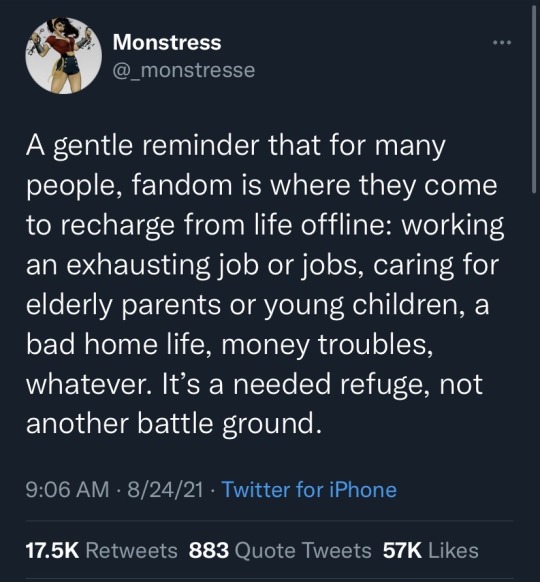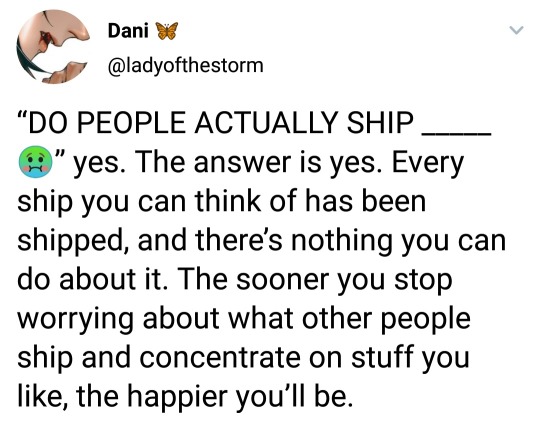Text

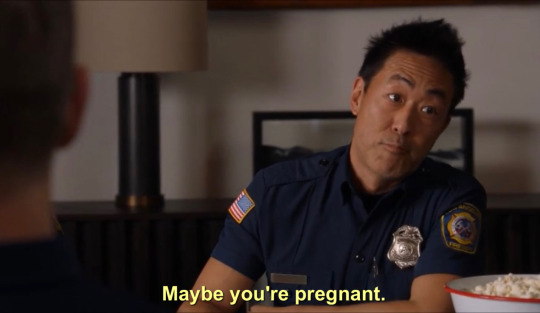

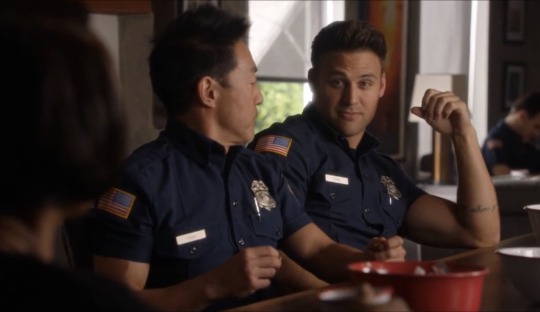
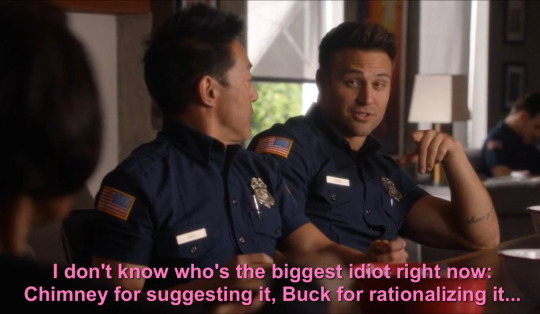
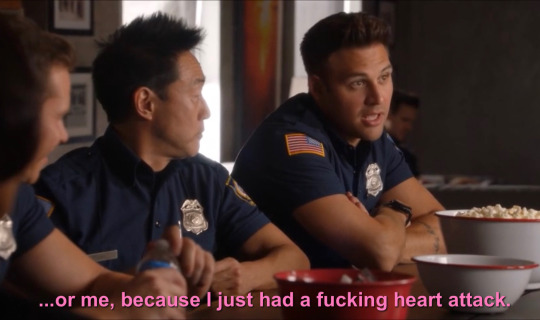
incorrect buddie quotes part idk
6K notes
·
View notes
Text
Hey, if you don't have something nice to say about other people's creations (gifsets, art, fic etc)
then
don't say anything at all.
28K notes
·
View notes
Text
Writers, it’s okay:
to be proud of your own writing
to write something self-indulgent
to celebrate your achievements
to have a bad day of writing
to hype up your own writing
to be kind to your characters once in a while. ok? it’s ok
11K notes
·
View notes
Text
Writing about a child rapist did not make Vladimir Nabokov a child rapist.
Writing about an authoritarian theocracy did not make Margaret Atwood an authoritarian theocrat.
Writing about adultery did not make Leo Tolstoy an adulterer.
Writing about a ghost did not make Toni Morrison a ghost.
Writing about a murderer did not make Fyodor Dostoevsky a murderer.
Writing about a teenage addict did not make Isabel Allende a teenage addict.
Writing about dragons and ice zombies did not make George R.R. Martin either of those things.
Writing about rich heiresses, socially awkward bachelors, and cougar widows did not make Jane Austen any of those things.
Writing about people who can control earthquakes did not make N.K. Jemisin able to control earthquakes.
Writing about your favorite characters and/or ships in situations that you choose does not make you a bad person.
It’s a shame that in this day and age these things need to be said.
135K notes
·
View notes
Text
Fandom Ickyness
I’ve been in so many fandoms over the last 20+ years, from Star Trek TOS, Gundam Wing, Harry Potter, Sherlock, Untamed and to more recently 9-1-1, I have a list of over 20 fandoms I’ve written in over the years, and not all posted because of Fandom Ickyness. I’ve seen fandoms rise and fall and oftentimes a fandom falls because of fandom policing, people trying to dictate what the writers in a fandom should be writing.
Most don’t think much when they go on a fic and go ‘I don’t like this because of so and so going on in it, it’s stupid’ or ‘You’re bashing on my fav character, I hate you and the air you breathe’ or even, ‘Those two shouldn’t be together, they are like brother/sisters/siblings, it’s wrong and you’re sick in the head’. It’s fine to not like what you are reading, but if you don’t like it, there is a back button for a reason. You don’t have to flounce your way out of a fic leaving a comment behind as you do. It’s rude!
When I first started in fandom, there was no tags, no nothing to warn you of what was going to be in the fic at all. I see something I didn’t like, I hit the back button and went to the next. I never, ever went into a fic knowing what was in it was something I didn’t like just because I wanted to shit on someone and what they took the time and energy to write.
I have been in fandom long enough to know what that kind of harassment and bullying can do to someone. I’ve seen the aftermath of someone ending up so low they had no way out in their mind. So when you get on your high horse and decide that you’re going to make a person regret even thinking about writing what they have, think again and remember that there is an actual live person on the other end who might be writing about what they are feeling at what they have seen in a film or show.
I know a lot of writers use writing and fanfics to get away from what they are going through, they use it as a tool to help them overcome mental health issues. I do the same, I’ve always used my writing to help with my mental health. It’s hard sometimes when I come across a comment, a review, telling me I should go and kill myself because they don’t like what I write.
Closing thought I want you all to think on. When reading something and coming across something you don’t like, think for a second before you leave a nasty comment about how you don’t like it because of such and such, and that they are a terrible person for even doing so. Think about what the writer is going through in their life, what trauma has been brought up by what they have seen on screen or even in their life that they are acting it out through the characters in a show/movie/anime. You never know what you might be doing to someone with the vile words that people speak, and it might be the thing that pushes someone already on the edge, over it.
15 notes
·
View notes
Photo
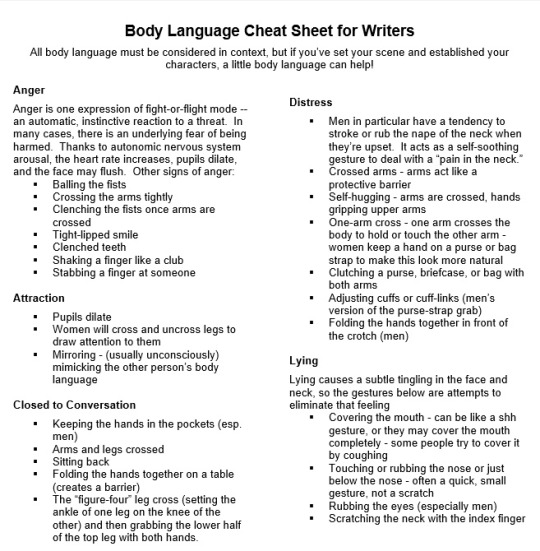
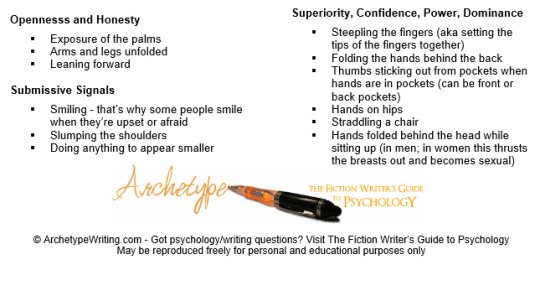
Body Language Cheat Sheet for Writers
As described by Selnick’s article:
Author and doctor of clinical psychology Carolyn Kaufman has released a one-page body language cheat sheet of psychological “tells” (PDF link) fiction writers can use to dress their characters.
467K notes
·
View notes
Text
give yourself the gift of reading your own fic. it was literally written just for you.
38K notes
·
View notes
Text
Shout out to people who also play imaginary scenarios in their head with their otp when trying to sleep
16K notes
·
View notes
Text
This tweet totally describes me

111K notes
·
View notes
Text
every time I see more of the ‘ao3 is evil’ crap circulating I think, ‘well, tumblr is evil too and I don’t see you stop using it’
80K notes
·
View notes
Text
On Fandom Policing: Part 1
This is gonna be an unpopular opinion, but I’m gonna come right out and say it: the “please examine your biases” argument in fandom is anti logic in concern-trolling drag. It is functionally meaningless, and has no actionable or observable objective within it aside from “don’t write this thing I don’t like”.
Asking someone to examine their biases is not inherently a bad thing. It’s something we should all do semi-regularly, like checkups or cancer screenings. But the problem with this argument in fandom is that you cannot know whether or not someone already has examined their biases, and chosen to create something you find personally objectionable or Problematic™ anyway. Arguing that people should do this in fandom creates the expectation that, if everyone were to examine their biases, the Thing—be it a trope, particular pairing, or popular trend—would simply cease to exist, because everyone would realize that it is Problematic; AKA, Wrong and Bad.
But Problematic™ fiction is not the problem these concern trolls want to make it out to be, because we live in an inherently flawed, problematic world, populated with inherently flawed, imperfect, messy beings. And that means that nothing is perfect or unproblematic, and the things that are, are probably incredibly unrealistic. They also risk being boring as hell. (1)
It also means that “examine your biases” turns into a Trojan Horse of fandom bullying and groupthink, where you have to, somehow, “prove” to the concern trolls that you have examined your biases before you’re allowed to create what you want, or before you’re allowed to enjoy what others have created and shared for free without fear of concern trolling or dogpiling. But you will never be able to prove that you have, actually, done the deep internal work they’re asking of you, because it’s internal, and fandom is not an accurate reflection of who you are as an entire person. The only thing they will have to go on, and the only thing they will judge you by, is whether or not you have continued to write The Problematic Thing they don’t like, regardless of your reasons for doing so. (2)
And, even if you do stop writing The Problematic Thing they don’t like? Chances are, whatever else you’ve written will be “problematic” in some other way. And I need you to know that that is okay, because no one piece of media—mainstream, indie, or fandom-generated—can provide all representation to all people, no matter how good it is. The point of creating good representation is to make sure everyone can have stories that represent the various facets of their identities, to see characters like them across different genres and mediums, so they can feel seen and validated and reassured that the world knows they exist. And that is a massive job that no single piece of media or single person can accomplish alone.
That’s why good representation is a team sport, and in the same way that sports teams have different members specializing in different roles, not everyone can write great representation for every group. And, to continue the metaphor, creating good representation requires practise and help. Criticizing people for doing badly only discourages them and makes them more likely to give up, not create better representation. It takes time to learn what good representation is, and how to create it, and—like any other skill—it is unfair to expect perfect execution 100% of the time. People need the time, space, and grace to fail and do badly before they are capable of doing well. Assigning ill intent to people in that phase is unfair, and you cannot know from the outside who is in that phase unless you have a close personal relationship with them. And, again, like a sports team: if you want the individual team members to do better, they need support and coaching from people they know and trust, not a mob of strangers screaming and hurling criticism from the stands. (3)
The argument around representing a Problematic thing being equated to supporting the Problematic thing in real life is a separate, also garbage, argument.
There are a wide variety of reasons for people to write Problematic™ things that are not “they are a horrible human being”, including, but not limited to: processing their own experiences; being new to writing, a particular fandom, or writing a particular minority group and making mistakes as they learn; and enjoyment of darkfic and the catharsis it provides.
This entire argument presumes and addresses good faith attempts at representation. I am fully aware that there are, in fact, bad faith examples out there, and a lot of bad faith erasure, but that is not the topic of this particular essay.
Part 2
122 notes
·
View notes
Text
On Fandom Policing: Part 2
I saw a post where someone argued that it’s not fandom policing to “call out problematic behaviour” and, on the surface, this seems reasonable. However, they are specifically referring to fic, meta, and other fandom contributions, which aren’t actually behaviours to be called out, but, rather, are thoughts, opinions, and creative content that people are providing for free. They go on to argue that those who are trying to “nip problematic tendencies in the bud” aren’t engaging in fandom policing or purity wank by doing so—they are, instead, keeping fandom safe for “everyone” by weeding out racist, queerphobic, or otherwise hateful rhetoric.
Unfortunately, this argument is not only flawed, but wrong on multiple levels. First and foremost because the lack of gatekeepers and prerequisites is the entire point of fandom—this is meant to be a place that welcomes everyone, because fandom is people coming together out of shared enjoyment of something, typically a piece of media. There’s no door guard making sure that every fic writer has completed a creative writing course before they’re allowed to share their stories, no professor quizzing you on the Reading List before you’re allowed to participate in discussions and share headcanons, and it’s not a cult where members are indoctrinated into the Correct mode of thinking. This is by design—it’s one of fandom’s strengths, because it means that every individual gets to have a voice, including voices from certain groups who have, historically, been silenced more often than heard.
The only way to preserve that space is to be firmly anti-censorship, because as soon as someone starts trying to impose rules on what content is and isn’t allowed, you run into the very real problem of “Who decides?” Who gets to say what content is and isn’t allowed? Is there an appeal process, or is their word law? What about content containing the problematic thing, but portraying it in a negative light? What about stories that feature the forbidden topic because the writer has personal experience? What about content that contains the forbidden topic, but someone didn’t realize it? What about the content creators who want to deliberately create content that deals with the forbidden topic—are they kicked out of fandom? Is their content locked? Who decides what does and doesn’t qualify as Forbidden Content? Are there any shades of grey?
As soon as you start really digging into the question of “who decides?”, you realize quickly that there’s no good answer. Even if you sent content dealing with racism to a person of colour, no single perspective can ever encompass all the nuance and complexity within an entire system of oppression. Additionally, no minority is a monolith—no two people from the same minority group are likely to have the exact same opinion or lived experiences, which means the only way to be fair about what is and isn’t allowed is to decide by committee. But then you run into another set of difficult questions: what happens when the committee doesn’t agree? How big does the committee need to be? How are you going to find people to fill the committee seats, and are they expected to put in that kind of emotional labour for free? If they’re going to be compensated for their time and effort, who’s paying them? Where’s the money going to come from? What happens when a committee member needs to step down? How do you handle conflicts of interest? Does every fic need to be submitted to this hypothetical committee for screening, or only fics that are flagged? If it’s the latter, what happens when content slips through the cracks? If it’s the former, how do you prevent a bottleneck?
Because there are no good answers to these questions, and no set of content rules that does not raise them, you’re left with the system we currently have, which is open to everyone, for better or worse, and the rules of engagement are always “curate your experience” and “Don’t like? Don’t read”. No single person has the right to tell another what they can and cannot write about, headcanon, interpret, think or believe about the fictional characters and universes that fandom is based on, because there is no official content arbiter. And that is a*very good thing for vulnerable people participating in fandom, who are able to engage with content online and be exposed to ideas that they wouldn’t be able to offline. The fact that no one has to present credentials means that no content creator is forced to out themselves just to be able to create and share the art that they need to—no one has to declare or prove their race, gender, cultural heritage, sexual orientation, disability, or past trauma to find freedom and catharsis in fictional characters.
And it is a staple truth of fandom that writers and readers alike find freedom and catharsis from their personal struggles through engagement with fanfic and fandom as a whole. It is unfair to take that away from them, and equally unfair to force them to disclose personal information before allowing them to participate, which means we never know what someone’s reasons are for thinking, feeling, interpreting, or writing about our favourite characters in the way that they do. Calling out a fanfic author for the way they’ve written a form of discrimination in their fic means you risk calling out a minority group-member for writing about their own experiences, and put them in the terrible position of having to either disclose, or risk being dogpiled by people claiming to want to make fandom a better, safer place.
The problem is that this kind of behaviour doesn’t make fandom safer, and it doesn’t have the impact these fandom crusaders want it to have. There’s a very big difference between someone writing and sharing something that you find personally distasteful, and something that causes or perpetuates actual harm. There are a number of fanfics that I don’t read because I find the subject matter, or characters, or universe set-up to be personally distasteful—but the fact that these stories exist does not harm me, or anyone else.
And the reason why these stories—or any other that are deemed “wrong” by the crusading crowd—existing is not harmful is that we do not and should not crucify people for thought crimes. In a fictional story, no person is actually harmed. Real people might, conceivably, be triggered by content therein, but that is a separate matter, and the actual harm that they are reliving was not done to them by a fictional piece of media—the harm they are reliving was inflicted by an actual person or persons. Triggers are real, and trauma is valid, which is why I will always advocate for proper tagging and content warnings for fanfiction—but never about what fanfic is allowed to exist. Because a fanfic pressing on a bruise is not equivalent to an actual person enacting violence upon you to leave that bruise, and treating them as if they are is not only a failure of critical thinking, it’s actively dangerous—to the creative community, because of the subtle advocacy for censorship; to readers, because it allows them to push off responsibility for their own well-being onto others, when they need to be using their best judgement to curate their own experiences online; and to fandom as a whole, because in-fighting and bullying over what is and isn’t allowed can, will, and has torn fandoms apart and driven creators off in a bid to escape the toxicity.
The thing that the policing groups never seem to understand is that what people choose to put into their fanfic is not, and never has been, the problem in fandom. The problem in fandom has always been how people treat each other. Ultimately, it doesn’t matter if you’re a popular writer or if you’re the single person in the rarepair rowboat if you’re going out of your way to try and police other people’s creative works. You can draw whatever lines you need to around yourself to limit your media consumption for your own comfort and well-being. You do not get to police where other people draw their lines, or what art other people choose to make. That is a violation of other people’s boundaries, and is much, much worse than someone writing the absolute worst fic you can think of—because that fic isn’t hurting anyone, whereas the choice to police others does cause harm.
Fandom is vast, and contains multitudes. It will never be a monolith, and that’s fine—that is, in fact, the point. Fandom is not beholden unto canon, and the sheer diversity of thought, feelings, opinions, headcanons, imagination, and lived experience is what makes this such a vibrant and engaging place. Trying to slap limits all over it only ruins the day of the person you’re choosing to inflict yourself on—ultimately, you aren’t actually making things any better, because what you’re doing is bullying. Even when you think you’re in the right, because you’re “calling out” content, trends, or tropes that are “problematic”. And bullying doesn’t make things better for others, regardless of your intention— because the people who care about what they’re writing will improve on their own, as they learn and grow and become more educated on the Discoursical Topic du Jour, and the people who don’t care will do as they please, and won’t be swayed by bullying tactics of internet strangers.
Fandom is meant to be fun. If it’s not fun for you, then it’s up to you to change that— hang out with different people, ask friends for fic recs, stage re-watch parties, focus on whatever it is that will bring you joy. But whatever you do, don’t try to control how others enjoy fandom, because that’s not your place.
Part 1
195 notes
·
View notes


